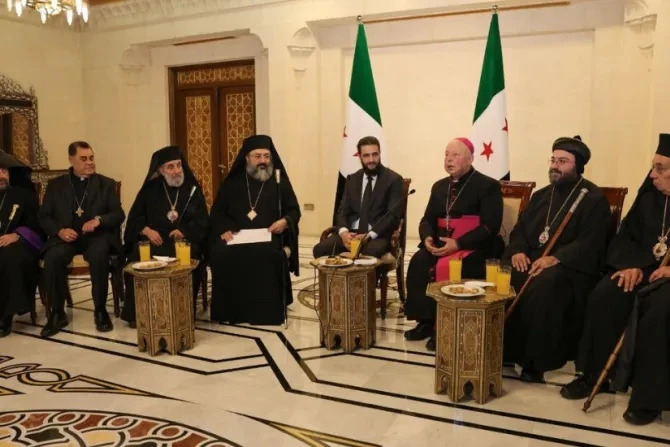As Syria navigates a transitional phase, questions abound regarding the Church’s role in shaping the new Syrian nation. Has the picture become any clearer after the meeting between Ahmad al-Sharaa, head of the new Syrian transitional administration, and Church leaders at the People’s Palace in Damascus?
The recent gathering included significant participation from Franciscan friars, including Father Ibrahim Faltas, deputy custodian of the Holy Land, along with other Church representatives.
In a press conference, Father Rami Elias, SJ, revealed that the purpose of the meeting between al-Sharaa and Christian clergy was introductory, allowing Church leaders to voice their concerns and questions.

The clerics discussed issues related to the Syrian Constitution, democracy, and equality. Al-Sharaa responded by citing his long years living alongside Christians in Damascus and Daraa. He affirmed that Christians are an integral component of Syrian society.
When asked about al-Sharaa, Elias remarked: “It is ambiguous — we cannot discern his true intentions.”
He noted that al-Sharaa openly expressed his desire to implement a civil legislative system of governance.
“There are no guarantees, and we remain in limbo,” Elias added. “In my opinion, if the United States and European nations maintain their current stance on Syria, we could see the establishment of a civil state, possibly with an Islamic but moderate tone. However, we will be powerless if these nations shift their position.”

Elias did not hide his unease about the uncertain reality, as the future path for Syrians remains unknown. Nonetheless, he urged Christians not to fear, stating: “Our situation will not be worse than it was before.”
Elias emphasized the importance of the Church taking advantage of the present moment to draft its proposal for the upcoming constitution. He foresees that the 1950 constitution might gather widespread approval, albeit with certain amendments.
The meeting did not include the three patriarchs of the Antiochian See residing in Damascus but rather their representatives.
By Souheil Lawand | catholicnewsagency






